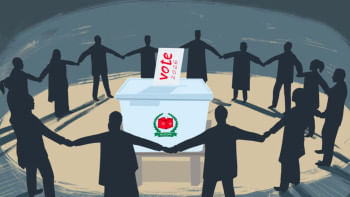Loans for CMS sector should be simplified
Banks should approve loans for as many companies as possible from the Tk 20,000 crore government stimulus package as the latter will provide credit guarantees and subsidies on interest payments, said a top Bangladesh Bank official yesterday.
Banks traditionally issue loans almost exclusively for existing clients to reduce default risks and are reluctant to disburse funds without knowing a potential borrower's track record.
However, the government will now share the risk by insuring up to 80 per cent of any loan taken from the stimulus package by cottage, micro and small (CMS) enterprises under the Credit Guarantee Scheme (CGS).
Moreover, of the 9 per cent interest rate, the government will bear 5 per cent.
Therefore, commercial banks should lend money to CMS enterprises, which play a vital role in the economy, on flexible conditions so that they can benefit from the stimulus package, said Abu Farah Md Naser, executive director of Bangladesh Bank. A Tk 60,000 crore fund will be rolled out in the Tk 20,000 crore packages over the next three years, Naser added.
He urged banks to make quick disbursements so that the various industries affected by the ongoing coronavirus pandemic can resume normal operations.
Naser also suggested that banks should even lend money to unbanked entrepreneurs after verifying their business turnover to maximise the number of borrowers.
For instance, Bangladesh Bank recently gave loans to microfinance institutions (MFIs) for the first time as they have over three crore individual borrowers.
The central bank has also been working with Bangladesh Investment Development Authority to support startups, Naser said during a virtual discussion styled "CMSME's Access to Finance and the Way forward".
The event, featuring senior officials of various commercial banks and businesspeople, was organised by the Dhaka Chamber of Commerce and Industry (DCCI).
Moderating the discussion, DCCI President Shams Mahmud said cottage, micro, small and medium enterprises (CMSME) represent 13 million business entities and account for about 35.49 per cent of employment.
However, many entrepreneurs are facing numerous challenges when trying to secure loans from the stimulus packages, he said, adding that non-banking channels could be useful in disbursing the loans. Besides, the definition of SMEs needs to be unified in all policies, Mahmud said.
Md Afzal Karim, deputy managing director of state-run Bangladesh Krishi Bank, said they provided the loans to 945 people, which was 29 per cent of their disbursement target.
Many are being deprived for a lack of collateral, he added.
Only 28 per cent of the sector has access to finance compared to 44 per cent of large-scale enterprises, said Akhil Ranjan Tarafder, general manager of the Bangladesh Small and Cottage Industries Corporation (BSCIC).
Documentation processes, a lack of collateral and banks' unwillingness are some of the reasons for disbursement delays. Moreover, the Tk 20,000 crore stimulus package is insufficient for the entire CMSMEs sector.
"The BSCIC plans to establish 50 industrial estates on 20,000 hectares of land," he added.
DCCI Vice President NKA Mobin said the CMSME sales have slumped 35 per cent for the pandemic.
About 62.4 per cent of CMSMEs are now unable to pay workers' wages or tax and VAT. Most entrepreneurs find fulfilling loan requirements challenging for which 59 per cent of CMSMEs find the loan disbursement process complex.
Nazeem Sattar, general manager of SME Foundation, urged framing a guideline for small-scale entrepreneurs, saying they had a few going through the industries ministry for approval.
He also insisted on creating an alternative, flexible financing model.
Ferdousi Begum, joint secretary to the industries ministry, said banks' willingness was needed to successfully disburse the packages. More trading-based entrepreneurs should be allowed access to the fund, said Syed Abdul Momen, head of SME at BRAC Bank.
Sanjib Kumar Dey, head of SME at Mutual Trust Bank, said the package were yet to be fully explored. They aim to disburse Tk 301 core from the fund, 40 per cent by August and the rest by December.
Anwar Faruque Talukder, executive vice president (EVP) of Dutch Bangla Bank, said interruptions to demand and supply were hampering the domestic market's revival.
His organisation plans to disburse Tk 340 crore, on which he suggested extending the repayment tenure from the existing one year.
Sk Moyeen Uddin, additional deputy managing director at EXIM Bank, stressed bringing unbanked SME entrepreneurs under official banking channels and on the need for financial literacy among CMSMEs.
Syed M Omar Tayub, head of MSME at Prime Bank, suggested more stimulus funds for the trading sector to avail the maximum advantage.
Mohammad Emtiaz Uddin, EVP of Premier Bank, said such financial support needed to reach rural areas. "We got approval to disburse Tk 120 crore," he said.

 For all latest news, follow The Daily Star's Google News channel.
For all latest news, follow The Daily Star's Google News channel. 



Comments